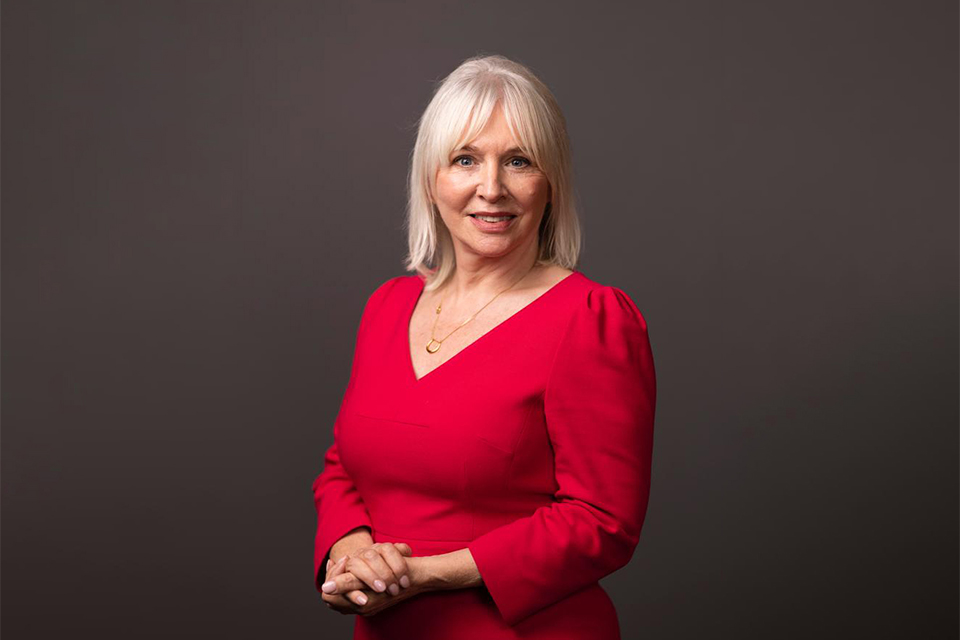Secretary of State Nadine Dorries' speech at the Creative Coalition festival
Culture Secretary Nadine Dorries outlines strength of the UK's creative industries

Hello everyone, and welcome to this year鈥檚 Creative Coalition Festival.
It鈥檚 great to be part of this event - and I know you鈥檝e got all sorts of interesting speakers to look forward to over the next three days:
People from the world of TV and music, fashion and street art, illustrators and cartoonists, composers and writers.
All of those individuals, scattered across the UK, come together to form a creative powerhouse that is now worth over 拢116 billion to our economy.
In fact, I was reading an article in the Sunday Times the other day that I think encapsulates where we are as a nation today.
The article argued that of all the things we鈥檙e good at in the UK - and there are many - we鈥檙e best at the arts.
And the author had plenty of evidence from the last few months alone to back that claim up:
Coldplay鈥檚 latest album went straight to No.1 in 14 countries.
Dua Lipa鈥檚 Levitating was the most streamed song in the US and Adele鈥檚 30 the biggest-selling album of 2021 worldwide.
Brits from the world of TV, film and advertising regularly sweep the awards shows.
Emma Thompson and Bill Nighy are leading the charge for British productions premiering at this year鈥檚 Sundance.
And on social media, the most-mentioned British educational institute isn鈥檛 Oxford or Cambridge - but Hogwarts.
The point is, it鈥檚 our writers and musicians and designers and composers who are most celebrated around the world today - and who do the most to sell the UK abroad.
They wield an incredible amount of influence, and because of that, the reputation of Global Britain depends on them.
Which is why this government is determined to protect those industries and build on their success.
I say this, by the way, as someone who has spent hours of their own life pouring blood, sweat, and tears into their novels. So I know what a labour of love the creative process is.
It鈥檚 why we stepped in during the pandemic - at a time when every single industry was crying out for our help - and took the unprecedented decision to spend 拢2 billion of emergency rescue funds to protect our arts and culture and 拢500 million to keep the cameras rolling on productions across the country. As a result, our film and TV sector is booming, with studios booked out nationwide.
It鈥檚 why we put the creative industries at the heart of our recovery plan.
And it鈥檚 why we鈥檙e looking to strengthen those industries for the future - inside and out - so that they鈥檙e open to all so that they protect the people who work in them.
And so, ultimately, they can continue to grow and grow in the decades to come.
For example, I鈥檝e been working closely with Rebecca Ferguson - who I know you鈥檒l be hearing from at this festival and who has bravely spoken out about her own experiences of bullying and harassment in the music industry.
We鈥檙e also looking very carefully at the issue of music streaming, competition and fair payment, to make sure the modern music industry works for everyone.
And we鈥檝e got lots of exciting projects coming up as a result of the recent Spending Review.
Today, I can announce we intend to provide close to 拢50m to support creative businesses across the UK. This includes 拢21m to deliver a multi-year UK Global Screen Fund, 拢8.4m for the UK Games Fund and 拢18.4m for an expansion of the Creative Scale-Up programme, to support the fastest growing creative businesses across the country.
This will form the foundation for an ambitious Creative Industries Sector Vision which we are hoping to publish in the summer.
The Sector Vision will have four key objectives:
To ensure the UK creative sector is globally competitive; inclusive; environmentally sustainable; and embedded within communities up and down the country.
And I鈥檒l be bringing my own clear personal priorities into this vision.
I know, for example, that it has to focus on improving accessibility.
We have to do better at making sure that people from deprived backgrounds instinctively feel that the creative industries are for them, too.
That they don鈥檛 just have the opportunity to dedicate their life to literature, or writing or film - but that they can rise to the very top of these industries.
And I鈥檓 also very keen to make sure the Vision is directed at our overall mission to level up - that it asks how we can use the creative industries to regenerate left-behind towns and communities, and drive growth across the entire UK.
After all, levelling up isn鈥檛 just about transport links and infrastructure projects.
It鈥檚 about giving people the chance to live rich and fulfilling lives, wherever they are in the UK. Lives full of creativity and culture, and good jobs in those industries.
Those are my priorities.
But my department will be working closely with the Creative Industries Council to develop the Vision, and I鈥檓 keen to hear from the wider sector about what you鈥檇 like to see.
We want this piece of work to be really visionary, ambitious and optimistic.
Creative UK - through Caroline Norbury - sits on the Creative Industries Council, and I鈥檓 sure she will do a fantastic job at feeding in your views.
There is also a session later this week with my colleague Minister Lopez to discuss some of the priorities that you see for the sector over the next few years.
This will help inform our work on developing the Sector Vision, so don鈥檛 miss that! We look forward to hearing your views.
In the meantime, I hope you enjoy the rest of the programme, and that you have a great festival!
Thank you.